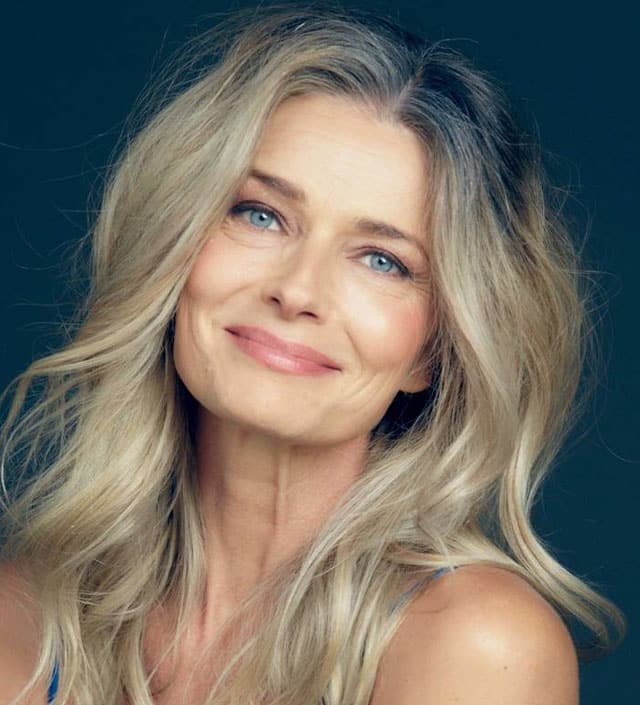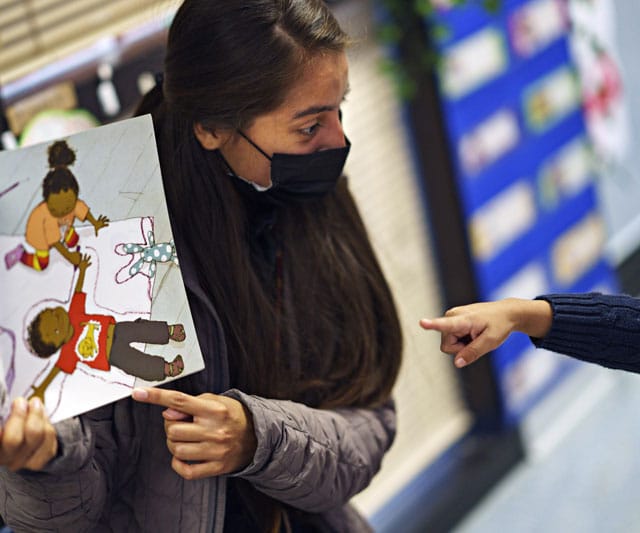Imagine this: It’s 1968. A couple flees their native Czechoslovakia for Sweden to escape the invasion of the Soviet Union. When they return for their daughter only to learn the borders are closed, they stage a hunger strike, turning their cause — and their child — into a media sensation. The girl is raised by her grandmother until the age of 9, when she’s finally reunited with her parents, their faces splashed on the cover of every Swedish newspaper.
Six years later, at age 15, the girl relocates to Paris, where she becomes a highly sought-after model, gracing the cover of magazines around the globe and eventually signing an enormously lucrative, seven-figure contract with Estée Lauder. She marries a rock star, has two beautiful children and lives a glamorous life in her Manhattan townhouse.
But wait — those are just the fairy tale highlights. As Paulina Porizkova shares in her new memoir, “No Filter: The Good, The Bad, and The Beautiful,” for every glossy high there have been as many devastating lows. The full picture: Upon relocating to Sweden to be with her parents, her mother and father immediately separate. She finds herself in a new country without her beloved grandmother and is bullied relentlessly at school (at one point having her head shoved into a toilet). As a model, she’s subjected to sexual harassment. When, at age 19, she begins a relationship with Ric Ocasek of The Cars, she learns he is already married. Five years later they wed, and though they remain married for 30 years, she discovers after his abrupt passing in 2019 that he has cut her out of his will, leaving her with no income, two “extensively mortgaged” houses and pension plans that “could not be touched for another ten years.”
“I hope what readers get out of the book most is a sense of comfort, which is what I so needed when I was going through my grief.”
In the aftermath of these struggles, however, Porizkova finds her voice. She launches an Instagram account in which she posts images of herself at her most vulnerable. With each tearful selfie, she pours out her pain, sharing her thoughts on grief, betrayal and anxiety. She becomes known as “the crying lady on Instagram,” and builds a following of more than 800,000 people who are attracted to her emotional relatability.
Now, in “No Filter,” she’s delving deeper. A collection of essays on marriage, motherhood, heartbreak and so much more, the book, she says, is meant to serve as solace for those who need it. “I hope what readers would get out of the book most is a sense of comfort, which is what I so needed when I was going through my grief,” she tells Next Avenue. “I know what feeling really lonely is, and I hope that my book can be like a friend. I’ve been there. I’ve been in the same spot, and we’ll make it through.”
Porizkova recently spoke with Next Avenue about her book, the power of vulnerability and falling somewhere between JLo and Betty White.
The following interview has been edited for clarity and length.
Next Avenue: You cover many topics in this book. Did you go into the process knowing what you wanted to write about? Or did the topics come up organically?
Paulina Porizkova: Some of the topics I knew I wanted to talk about; some just came to me. The essay about occupation [on the Soviet occupation of Czechoslovakia] — that one just fell out. It was completely unexpected. I had just traveled to Israel to go to my godson’s wedding, and Ukraine was invaded the day that I got there. It was just like, “This is what I need to talk about now.” So, none of it was really premeditated. It wasn’t like, “I need to write an essay on this, and I need to write an essay on this.” But it’s things I have been talking about on Instagram, and aspects of me that I thought would be worth talking about. And, obviously, having to delve into my history a bit to give people an idea where this was all formed. This is why I am who I am.
A big focus of the book is the loss of your husband. It’s been three years since he passed. How are you doing now?
I think I’ve mostly forgiven my husband. For the last three years, I’ve done an immense amount of self-work, and what I’ve come to realize is that what we had was real love. For all its faults, there was a lot of love for a long time. It doesn’t make his betrayal easier to carry, necessarily, but it goes into the same bag with, “Hey! Your parents don’t want you. Hey! You’re gonna be taken away from your grandmother.” It goes into that same bag, but at least now I know that I’m carrying this bag and I can sort those elements out. I’m not given it as a child without understanding the consequences. I can mostly think of my husband with love now.
In the book, you describe the anger you felt while mourning his death. You asked questions like, “How could I have been so stupid? How was I so wrong about the past 30 years of my life?” But then you write that you’ve come to a place where you can “finally just miss him with an uncomplicated longing.” For those who are reading this and may be grieving, do you have advice on how to get from the anger to the more “uncomplicated” place?
[Shakes head no.] There is no advice. The one thing that I found with my own grief is what a huge thing grief is and how it overwhelms you and threatens to drown you. There is no advice for a grieving person except acceptance. You’re mourning, you have the right to be grieving, you have the right to feel everything you feel. It’s not advice for the grieving person, because they’re in no place to receive any f****** advice, frankly, and no advice is going to help them. It’s more advice to the people that surround the grieving: Be patient with the grieving. Just be there for them. Hold their hand and let them grieve. Don’t try to make them feel better because they won’t.
In one of the essays, “Real Money,” you write that although you earned the same amount as Ric did, your earnings were always considered frivolous and “something nice to have,” whereas his money was “the serious money.” What is your message to women, particularly young women, about career and money?
“The one thing I found with my own grief is what a huge thing grief is and how it overwhelms you and threatens to drown you.”
Had you given me advice when I was in my early twenties and madly in love with my husband about how I should mind my finances, I [would have] ignored it. So, advice to the young? They’re not gonna take it. Save your breath. I can just give you my own story and say I wish I had paid more attention to my money. I wish I would have kept a separate account. Most of all I wish I hadn’t handed over that part of me to my husband. If a friend came to me to ask, “What should I do?” I’m definitely going to be like, “You need to have your own [bank] account. I know you’re doing all the housework and all of the child minding, and you also have a job, but you need to pay attention to this, because it might bite you in the ass, as it does many women.”
I also think that if you want to be a stay-at-home mom — a very, very hard job — you and your partner should eke out a salary for you from his salary. Make sure that there’s a certain amount of money put aside for all the work that you do at home that is unpaid, so that you actually have your own bank account, because you’re worth that. You are putting in a tremendous amount of work for your family and you are owed a certain amount of money. Because it turns out that the law can f*** you over depending on what state you live in.
As a model and musician’s wife, you’ve often been written about as if you’re a one-dimensional character with no voice of your own. Now, you have an engaged following on Instagram. What has that platform offered you? Do you feel like you’ve had a chance to express yourself in a way that you hadn’t before?
Bingo! You’ve completely answered your own question. That’s exactly what Instagram did for me. I wasn’t aware that it would do that for me. Initially, I went on Instagram because somebody said I ought to. It wasn’t until I was drowning and sending out little tentacles of, “Please help. I’m so alone over here” that this community started following me. And it’s still there! My original followers that started following me two, three years ago when I was really in the dumpster are still there. I recognize their names and it’s like a little community, which is absolutely amazing. Being able to speak uninterrupted straight from me to [my followers] has allowed me to be heard, and that’s been a tremendous gift. Most accidental, but fantastic. It gives me the opportunity to speak to people directly and for them to listen, which I’m not used to.
The first essay in your book is called “The Crying Lady on Instagram.” I actually remember you as the crying lady from The Cars video.
Oh yeah! That is how I met my husband — by being a crying lady in a video.
Which is funny, because you recently wrote on Instagram that you used to think crying was weak, “more personal and vulnerable than being unclothed.” Yet it’s specifically that unabashed honesty that attracts your followers. Is there a message you’re trying to convey about vulnerability?
“We shouldn’t be invisible. We’re way too cool to be invisible.”
Yeah. And again, this is not at all premeditated. I didn’t think, “If I share my vulnerabilities, people [will] share theirs and everybody will be in a happier world.” That was me casting bottles from my deserted island with little messages going, “Please help, please help.” It wasn’t until I walked into that bar [written about in the essay], and this young woman said, “You’re the crying lady on Instagram! Thank you for what you did for me, because now I feel like I can share my vulnerabilities” that I realized it had a much further message than just, “Help. I’m drowning.” You’re allowing other people to go, “Help. I’m drowning, too!” Away with the pretense, in with vulnerability and authenticity!
Many of your Instagram posts include #betweenjloandbettywhite. What does that hashtag mean to you?
Oh, that’s the blind spot between JLo [Jennifer Lopez] and Betty White. Us older women are well acquainted with the invisibility between being older but looking much younger to being an adorable old lady. Between those two women, we’re invisible. That’s the spot that I’m claiming and going, “Mmm. No. We shouldn’t be invisible. We’re way too cool to be invisible.” Let’s speak out about it, because the way you stay invisible is by accepting it. The only way that’s going to change is by us not accepting it. Speak up!
It seems like you’re in a good place, where the heaviness of mourning is behind you and you’re on to the next chapter. What are you looking forward to in this next phase of your life?
The acute grieving is done. The trauma and the betrayal — all the acuteness of those emotions is pretty much done. I do feel like I’m coming of age again. It was like a rebirth, the phoenix, whatever you want to call it, this is the second stage. The first coming of age, the only equipment you have is hope and an utter naivete about the workings of the world. The second time around, I still have hope, but I’m way better equipped for the world. [Laughs] It still remains to be seen where that goes, quite honestly.
Can I give you a blissful happy ending to this story? No, because I’m only 57 and I hope to live a lot longer. For now, it’s finding my purpose in life, finding out who I am by myself, not as a mother and not as a wife, not as a model, not as whatever projections have been made of me, but who I actually am. And accepting that that’s all that I am, and that’s everything that I am. I’m still working on it.
©Next Avenue. This article was first published on nextavenue.org.







